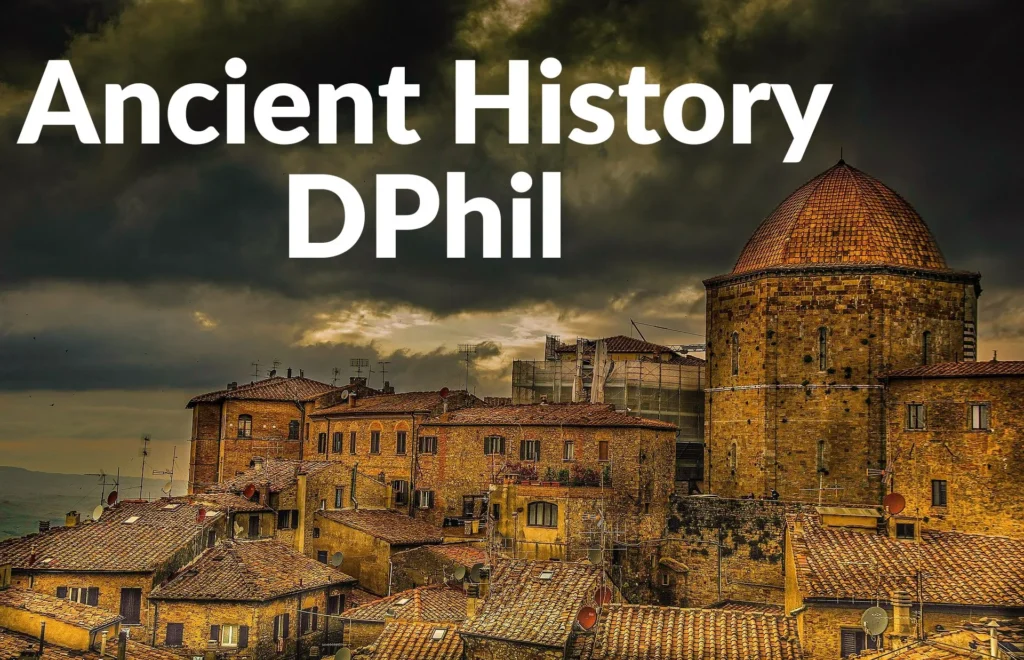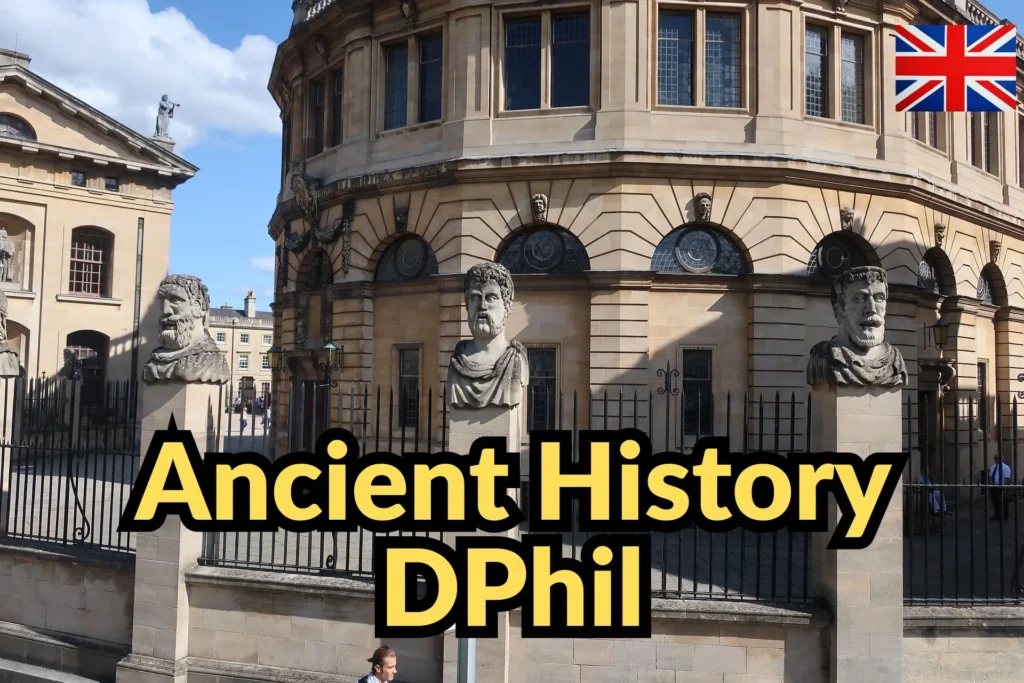Ancient History DPhil
The DPhil in Ancient History at the University of Oxford is one of the most prestigious and intellectually stimulating doctoral programs in the world. Designed for students who wish to conduct advanced research into the civilizations of Greece, Rome, and the broader ancient Mediterranean world this program provides unparalleled academic depth and research training. Oxford’s long-standing tradition in classical studies and access to exceptional resources make it the ideal place to pursue doctoral-level research in ancient history.
For students passionate about exploring the political systems cultures, economies, and societies of the ancient world the Oxford DPhil offers an extraordinary opportunity to work with world-leading historians, archaeologists, and linguists. This program not only nurtures academic excellence but also equips graduates with analytical and critical thinking skills essential for a successful career in academia or beyond.
Why Study Ancient History DPhil at Oxford?
Nothing beats the reputation of Oxford University in terms of ancient studies. The Faculty of Classics supervises the Ancient History DPhil, one of the largest and most highly regarded in the world. Its researchers have advanced our knowledge of the ancient world, from early Greek Civilisations to the decline of Rome.
Students at Oxford benefit from:
- Global Academic Excellence: Oxford University is world-leading and internationally renowned for Classics and Ancient History.
- Supervisor: Every student is supervised by one or more of the world’s top experts in their field.
- World-Class Resources: You’ll have access to the Sackler Library, Ashmolean Museum, Bodleian Libraries, and the Ioannou Centre for Classical and Byzantine Studies.
- The Research Community: Amenities in the form of a dynamic and stimulating research environment where article comments, presentations, articles reviews and collective pieces facilitate discussion on current affairs, events and innovation.
Funding and scholarships Several scholarships are available for excellent candidates, such as the Clarendon Fund and college-specific awards.

Course Overview
The DPhil in Ancient History is a research degree examined which also shows evidence of the candidate’s ability to pursue independent study and to understand primary sources in ancient languages. The dergree would normally take 3 to 4 years of full time study or 6 to 8 years part-time.
Students will be required to:
Conduct independent research culminating in a dissertation of not more than 100,000 words at the doctoral-level.
Contribute to classes lectures and workshops for the development of research skills.
Interface with cross-disciplinary approaches such as epigraphy, archaeology, numismatics, and literary studies.
Disseminate research results at scientific meetings and in peer-reviewed publications.
Participate in Oxford’s rich intellectual life.
The program emphasizes the preparation of a research proposal, archival or other systematic use of primary materials critical analysis based upon such sources and scholarly publication. Student work is critiqued and they are led through discussions, to help sharpen arguments.
Research Areas
The Ancient History DPhil covers a wide range of topics allowing students to explore the ancient world from multiple perspectives. Some key areas of research include:
Greek political and social history
Roman imperial and republican history
Economic systems in ancient civilizations
Ancient warfare and diplomacy
Gender, identity, and society in antiquity
Epigraphy and numismatics
Religion and mythology in the classical world
Cross-cultural interactions between Greece, Rome, and other ancient societies
Oxford University interdisciplinary approach encourages students to combine historical research with archaeological, literary, and philosophical perspectives, leading to richer and more comprehensive studies.
Teaching and Supervision
Supervision is at the heart of the DPhil. Every student is assigned a principal supervisor a senior academic with similar research interests to the student. Supervision is ongoing throughout the research design, methodology and themeing of one’s thesis.
Alongside one-to-one supervision students take part in:
- Research Seminars: Standard departmental bout which provides students with the opportunity to present their research.
- Workshops and Colloquia: Team-taught classes to include visiting scholars with students.
- Training programs for graduates: Academic writing, teaching and data management skills.
- Language Training: Assistance to individuals pursuing ancient or modern foreign languages, including German, French, and Italian.
The academic Enviroment at Oxford University is conducive to all students acquiring the intellectual independence, and scholarly rigor needed for original high-calibre research.
Entry Requirements
Candidates for the DPhil in Ancient History will be expected to have strong academic potential and research skills. The general entry requirements include:
- Educational Background: A degree such as Masters in Ancient History, Classics or Archaeology, or an equivalent qualification with a high standard of academic achievement (normally, a distinction/high merit).
- Provide a research proposal in five pages or less: (Keep the research proposal under five pages) -This research proposal should include Title and clear problem statement for your selected topic of interest or research question you wish to answer and Why that is a problem worth exploring using literature support -Discuss the method you would employ to evaluate this problem or question why are these methods appropriate given your sample population?
- Writing sample: Applicants are requested to submit a sample of their written work that presents a critical analysis and research capacity.
- References: 2 or 3 good academic references in support of the candidate’s suitability for doctoral research.
- English language proficiency: Non-native speakers of English must also evidence proficiency in English at the higher level required by the University:
- IELTS: An overall score of 7.5 (with a minimum 7.0 in each component)
- TOEFL iBT: 110 overall (with minimum section scores of Listening 22, Reading 24, Speaking 25 and Writing 24)
- C1 Advanced: 191 points (at least 185 in each component)

Fees and Funding
Tuition fees vary based on residency status. For the 2026–27 academic year, the fees are approximately:
Home Students: £18,970 per year
Overseas Students: £43,730 per year
Course fees cover academic supervision, access to libraries and research facilities, and departmental support. However, living costs such as accommodation, food, and travel are not included.
Scholarships and Financial Support
There is a range of sources of funding available at the University of Oxford, which include:
Clarendon Scholarships – Provides full scholarships covering both tuition and living costs for excellent graduate students.
College Scholarships – A lot of colleges give out partial or full scholarships.
Departmental and Research Council (RC) Awards – Structured around research topics or UK/ EU studentships.
Scholarships from Outside (It is also the case with Rhodes scholarships, Chevening and Commonwealth scholarships etc.)
Early applications are particularly recommended for those seeking scholarships as most are awarded between October and January.
Duration and Assessment
The DPhil in Ancient History normally takes:
3–4 years (Full-time)
6–8 years (Part-time)
The final award is based on the submission and successful defense of a doctoral thesis, examined by internal and external experts in the field. The thesis must represent a significant and original contribution to the study of ancient history.
Students also undergo a Transfer of Status and Confirmation of Status process—two formal reviews to ensure satisfactory academic progress before submission.
College Affiliation
Every Oxford student belongs to one of the University’s 43 colleges. Colleges provide academic and social support, accommodation options, and a sense of community. For the DPhil in Ancient History, students may apply to colleges such as:
Explore Oxford University Colleges
Full-time
- Balliol College
- Blackfriars
- Brasenose College
- Campion Hall
- Christ Church
- Corpus Christi College
- Exeter College
- Hertford College
- Kellogg College
- Lady Margaret Hall
- Linacre College
- Lincoln College
- Magdalen College
- Merton College
- New College
- Oriel College
- The Queen’s College
- Regent’s Park College
- Reuben College
- St Anne’s College
- St Catherine’s College
- St Cross College
- St Hilda’s College
- St Hugh’s College
- St John’s College
- Somerville College
- Trinity College
- University College
- Wadham College
- Wolfson College
- Worcester College
- Wycliffe Hall
Part-time
- Balliol College
- Blackfriars
- Campion Hall
- Christ Church
- Exeter College
- Kellogg College
- Lady Margaret Hall
- Linacre College
- New College
- Regent’s Park College
- St Catherine’s College
- St Hilda’s College
- Somerville College
- University College
- Wolfson College
- Worcester College
- Wycliffe Hall
Each college offers different facilities, scholarships, and environments, so applicants are encouraged to explore which one aligns best with their academic and personal preferences.
Career Prospects
And many of our DPhil in Ancient History graduates at Oxford pursue exciting careers both within and beyond academia. They are trained in research, analysis and critical thinking preparing for multitude of professional roles such as:
University Lecturers and Professors
Museum Curators and Archivists
Advisers in Sociopolitical and Cultural Organisations
Writers, Editors, and Researchers
Heritage and Archaeological Projects Consultants
Diplomatic and International Organizations
The generic skills acquired throughout the course of the DPhil, such as communication, doing independent research and analysis of data will make Oxford graduates sought after in both academic and non-academic environments.
Student Life and Support
There’s more to life in Oxford than the library. DPhil students are members of a lively academic community where intellectual endeavour greets personal development. The University offers:
Trainings & Mentoring: Built to help you with your mental health and career.
GCR: Rooms for meeting people and making friends.
Cultural and Academic Events: Lectures, museum- exhibitions and international congresses.
Libraries and Museums Access: Over 100 libraries, such as the Bodleian Library which is one of the oldest in Europe.
The historical ambiance of Oxford, together with its lively intellectual community, fosters an exciting setting for doctoral research.
How to Apply
Applications for the DPhil in Ancient History are submitted through the University of Oxford Graduate Admissions portal. Applicants should ensure they have the following before applying:
A well-developed research proposal
Official transcripts and degree certificates
Two or three academic references
Writing samples
Proof of English language proficiency (if required)
It’s strongly recommended to contact potential supervisors in advance to discuss research compatibility. The January deadline is the most important for those seeking scholarship consideration.
Conclusion
The DPhil in Ancient History at Oxford is the most advanced research degree of the University, and would normally be written up as a thesis. Emphasizing innovation, engagement, and intellectual seriousness, at the core of this program is an exploration of the ancestors of humanity’s first civilizations that continues to inform scholarly debates today.
Whether you seek to become an academic in a leading institution, a professional working at the heart of policy shaping, or a game-changing talent working in heritage education or conservation, Oxford is the place to develop your skills and career. This mix of academic excellence, mentorship and tradition means every graduate not only goes into an incredibly interesting job market with a world-class degree but also has the confidence to help shape what history will be in future.
If you have a passion for the stories of long ago and are keen to break new ground in understanding them, then Ancient History at Oxford is perfection – this course will give you the tools and knowledge to pursue your passion wherever it might take you.
